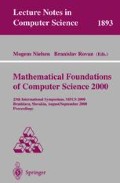Abstract
We consider the problem of leader election in asynchronous oriented N-node complete networks. We present a leader election algorithm with O(N) message and O(log logN) time complexity. The message complexity is optimal and the time complexity is the best possible under the assumption of message optimality.
The best previous leader election algorithm for asynchronous oriented complete networks by Singh [16] achieves O(N) message and O(logN) time complexity.
Supported by VEGA grant No. 2/7007/20
Access this chapter
Tax calculation will be finalised at checkout
Purchases are for personal use only
Preview
Unable to display preview. Download preview PDF.
References
Awerbuch, B.: Optimal distributed algorithms for minimal weight spanning tree, counting, leader election and related problems. In Proc. ACM Symposium on Theory of Computing, ACM, New York, 1987, pp. 230–240.
Burns, J.E.: A formal model for message passing systems. Technical Report TR-91, Computer Science Department, Indiana University, Bloominggton, Sept. 1980.
Dobrev, S.-Ružička, P.: Linear broadcasting and N log log N election in unoriented hypercubes. In Proc. of SIROCCO’97, Carleton Press, Ascona, Switzerland, 1997, pp. 52–68.
Dobrev, S.-Ružička, P.: Yet Another Modular Technique for Efficient Leader Election. Proc. of SOFSEM’98, LNCS 1521, Springer-Verlag, 1998, pp. 312–321.
Dobrev, S.: Time and Message Optimal Election in Oriented Hypercubes. Submitted to SWAT’2000.
Flocchini, P.-Mans, B.: Optimal Elections in Labeled Hypercubes. Journal of Parallel and Distributed Computing33(1), 1996, pp. 76–83.
Flocchini, P.-Mans, B.-Santoro, N.: Sense of direction:definition, properties and classes. Networks 32(3) 1998, pp. 165–180.
Gallager, R. G.-Humblet, P.A.-Spira, P. M.: A distributed algorithm for minimum-weight spanning trees. ACM Trans. Programming Languages and Systems 5, 1983, pp. 66–77.
Hirschberg, D.S.-Sinclair, J.B.: Decentralized extrema-finding in circular configurations of processes. Communication of the ACM23(11) 1980, pp. 627–628.
Israeli, A.-Kranakis, E.-Krizanc, D.-Santoro, N.: Time-message Trade-offs for the Weak Unison Problem, Nordic Journal of Computing 4(1997), pp. 317–329.
Korach, E.-Moran, S.-Zaks, S.: Optimal Lower Bounds for Some Distributed Algorithms for a Complete Network of Processors TCS 64(1), 1989, pp. 125–132.
Loui, M.C.-Matsushita, T.A.-West, D.B.: Election in complete networks with a sense of direction. Inf. Proc. Lett.22, 1986, pp. 185–187. Addendum: Inf. Proc. Lett. 28, 1988, p. 327.
Mans, B.: Optimal Distributed Algorithms in Unlabelled Tori and Chordal Rings. Journal of Parallel and Distributed Computing46(1), 1997, pp. 80–90.
Peterson, G.L.: Efficient algorithms for elections in meshes and complete neworks. Technical Report TR140 Dept. of Computer Science, Univ. of Rochester, Rochester, NY 14627, 1985.
Singh, G.: Leader Election in Complete Networks. SIAM J. COMPUT., 26(3), 1997, pp. 772–785. Preliminary version containing the proof of the lower bound appeared in Proc. of 11th Symposium on Principles of Distributed Computing, 1992
Singh, G: Leader Election Using Sense of Direction. Distributed Computing, 10(3), 1997, pp. 159–165.
Santoro, N.-Widmayer, P.: Distributed function evaluation in presence of transmission faults, in Proc. of SIGAL’90, Tokyo, 1990; LNCS 450, Springer Verlag, 1990, pp. 358–369.
Tel, G.: Introduction to Distributed Algorithms. Cambridge University Press, Cambridge, 1994.
Tel, G.: Linear Election in Oriented Hypercubes. Parallel Processing Letters 5, 1995, pp. 357–366.
Author information
Authors and Affiliations
Editor information
Editors and Affiliations
Rights and permissions
Copyright information
© 2000 Springer-Verlag Berlin Heidelberg
About this paper
Cite this paper
Dobrev, S. (2000). Time and Message Optimal Leader Election in Asynchronous Oriented Complete Networks. In: Nielsen, M., Rovan, B. (eds) Mathematical Foundations of Computer Science 2000. MFCS 2000. Lecture Notes in Computer Science, vol 1893. Springer, Berlin, Heidelberg. https://doi.org/10.1007/3-540-44612-5_27
Download citation
DOI: https://doi.org/10.1007/3-540-44612-5_27
Published:
Publisher Name: Springer, Berlin, Heidelberg
Print ISBN: 978-3-540-67901-1
Online ISBN: 978-3-540-44612-5
eBook Packages: Springer Book Archive

